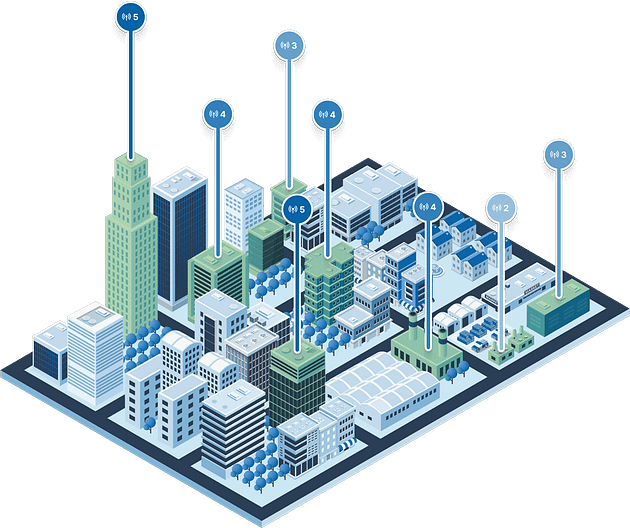Introduction
In the early years of property “intelligence,” platforms like Loopnet (acquired by CoStar in 2012) offered little more than photos and summaries of commercial properties that agents and brokers had listed for sale. At the time, these solutions were only for real estate professionals (e.g., Realtors, Lenders, Brokers, and Investors) to find available properties, perform due diligence, run “comps,” or sell.
Property intelligence software has come a long way since then. Today’s platforms gather data on millions of properties from hundreds of thousands of websites, enabling comprehensive insights and analysis.
No longer solely for real estate professionals, property intelligence platforms have become a treasure trove of insightful and accurate data for entire industries like commercial services businesses.
Selling commercial services can be tricky for sales teams, especially when it comes to dealing with buildings, property managers, and facilities managers. It’s a combination of finding the right decision-makers, meeting the complex needs of the property, and figuring out how to stand out in a busy market. Which can be overwhelming- especially if your sales tools are out of date.
In this article, we’ll talk about how property intelligence software works. We’ll discuss some of the top platforms, their features, and some of the core benefits of using them.
But first,

What is Property Intelligence Software?
At its core, property intelligence software collects, analyzes, and delivers actionable insights on commercial real estate. Property intelligence tools harness big data, artificial intelligence (AI), and machine learning (ML) to aggregate data from a wide range of public and private sources, such as:
Property records and permits
Tenant and ownership information
Contact data
Geospatial imagery (satellite, aerial, street view)
Utility and energy data
Market trends and comparable properties
Intelligence data on decision-makers.
Advanced ML algorithms then process this vast amount of data to surface the most relevant information for each property. The result is a comprehensive, continuously updated profile that empowers sales teams to understand prospects and tailor their approach deeply.
As you can imagine, this technology is revolutionizing how HVAC, roofing, cleaning, and other building services firms find leads, conduct outreach, and close deals- but before we get to that.

How Does Property Intelligence Software Work?
We touched on this in the last section, but property intelligence platforms leverage several cutting-edge technologies, including intent data, buying signals, sales intelligence data, machine learning (ML), and artificial intelligence (AI), to analyze insights and deliver actionable feedback that produces better sales outcomes.
They achieve this by consolidating data from many sources, creating a holistic view of the property and contact details for the decision-makers. This process creates a “single source of truth,” which can then be used to enrich data in your CRM, train Generative AI for outreach, and provide other tasks that streamline sales operations.
Integrating property intelligence software like Convex with a top CRM and a sales automation platform gives you a unified option for qualified lead generation on autopilot.
But let’s go a bit deeper on how the best top property intelligence platforms work.

Data Aggregation, Enrichment, and Cleansing
The first step is pulling in data from myriad sources and organizing it into a structured format. This is super important because if you have the wrong data, you end up with the wrong insights, which leads to poor decisions. It’s like a domino effect that can send you down the wrong path and hurt your sales performance!
A cleansed, unified property database enables precise targeting of ideal prospects based on firmographic data, permit history, property attributes, and sales intelligence data. This aspect of B2B sales intelligence plays a critical role in enhancing sales team productivity through lead identification, management, and data accuracy.

Computer Vision and Image Analysis
One of the most powerful capabilities is gleaning insights from imagery. Computer vision AI can analyze geospatial images to determine:
– Building size, height, and exterior materials
– Roof type, material, age, and condition
– Parking lot layout and spaces
– HVAC unit locations and details
– Points of interest or how the Surrounding land is being used.
If you’re trying to drive sales pipeline, having images attached can be incredibly useful. They say, “An image is worth a thousand words.” That’s even more true for a commercial services sales team. Imagine how much time you could save if you had accurate data for quotes, route mapping, and all kinds of other data points.
Visual property intel empowers sales pipeline with hyper-relevant outreach, too- An HVAC rep can reference a prospect’s rooftop HVAC units, while a paving rep can cite parking lot square footage and other details that show they’ve done their homework… or used a tool like Convex that did it for them.

Generative AI and Natural Language Processing (NLP)
Generative AI is a recent addition to the property intelligence marketplace—and, in fact, it’s still a relatively new concept overall. Generative AI is a type of artificial intelligence that enables machines to create original, unique content. This can be used in a variety of ways for sales and marketing outreach, from personalizing emails to creating custom reports on target prospects.
NLP is another critical aspect of generative AI and property intelligence software. It’s the engine that powers the creation of personalized messages by machines. NLP allows the software to “read” unstructured data like leases, service records, and permits, then extract key terms and clauses. This enables a deeper understanding of a property’s equipment, maintenance history, and management and puts that data in message form for outreach.
Instead of your team spending hours researching properties and crafting individualized emails, Generative AI does it by analyzing both public data (e.g., ownership information) and intent data (e.g., online resources visited). Then, with little human intervention, it creates bespoke email templates that sound like they came straight from your keyboard! Talk about a time-saver!
This can also help Reps uncover “trigger events,” like HVAC warranties expiring or elevators approaching inspection dates, to time their outreach perfectly.

Predictive Analytics, Lead Scoring, and Predictive Maintenance
AI offers some of the best filtering capabilities of any tool available on the market today. Property intelligence tools with “baked-in” AI features offer increased data visibility and faster action on insights.
One area in which they outperform humans is pattern recognition. By analyzing historical patterns, AI models can predict factors like:
Likelihood of a property needing specific services
Estimated cost and scope of potential projects
Ownership’s propensity to buy based on past behavior
Tenant information
Projected energy/utility consumption and costs
These AI-powered scores help prioritize the highest potential opportunities. Additionally, buyer intent data from companies like Bombora and 6sense analyzes online activity to identify prospects with active buying intent, allowing for more targeted outreach and engagement strategies.
Predictive analytics like active buying intent surface ready-to-buy prospects and provide the necessary context for sales conversations.
This allows your team to find “hot” leads and send a tailored message in minutes.
API Integrations and Workflow Automation
Property intelligence platforms integrate with CRM, marketing automation, sales engagement tools, and other sales tech. For example, Convex and Hubspot integrate to create a “one-stop shop” for lead generation and pipeline management.
Integrations like this allow key insights to flow into reps’ existing tools and trigger automated workflows like:
Lead routing and assignment
Personalized email and direct mail campaigns
Nurture and Follow-up campaigns
Customized proposals, quotes, and bid generation
Reminders for upsells, renewals, and other cyclic events.
While solutions like Convex can easily stand on their own, connecting them to Hubspot or another top CRM allows seamless integration of sales workflows. This increases efficiency in sales operations and boosts rep productivity.

Benefits of Property Intelligence Software for Commercial Services Sales Intelligence
It seems like we’ve been talking about the benefits of property intelligence software for a while now, but in reality, most of what we’ve covered are functions.
Let’s shift the conversation to not only the benefits of these solutions but also the impact.
The impact of property intelligence on commercial services sales is transformative. Top benefits include:
Increasing win rates
Shortening sales cycles
Improving deal size and margin
Boosting rep productivity and morale.
Traditional methods for gathering intel on properties are tedious, time-consuming, and often inaccurate. Property intelligence software streamlines the process, providing accurate and comprehensive data in a fraction of the time it would take humans to gather the same information.
Identifying Ideal Prospects at Scale
Property intelligence software enables service firms to define their ideal customer profile based on property attributes and instantly find buildings that match their target geographies.
Imagine you’re reaching out to a facilities manager at an office building. You see that their HVAC system might need some servicing, and they manage a dozen other office buildings—two of which could use the same attention. By using property intelligence software, you can instantly see this and personalize your communication with the prospect.
The days of manually researching and cold-calling hundreds or thousands of buildings to find a few interested buyers are over. With property intelligence software, sales teams can move beyond generic prospecting to laser-focused pursuit of the most profitable opportunities.
Conducting Hyper-Relevant Outreach
With deep knowledge of each prospect’s property, sales reps can craft highly personalized outreach that demonstrates expertise and value. This is where Generative AI comes into play. AI-enriched data points like roof age or HVAC tonnage help reps speak to the unique needs of each building and make outreach messages hyper-relevant to their potential customer.
This can greatly optimize their outreach efforts and enhance conversion rates- which accelerate sales and revenue.
Accelerating Sales Cycles
Reps can quickly tailor conversations, quotes, and contracts by integrating property insights directly into CRM and using Generative AI for outreach.
In this way, property intelligence software streamlines the prospecting process, allowing sales reps to focus on high-value conversations and close deals faster.
We’ve already touched on this several times, so I’ll leave you with this final thought on accelerating sales – when deals close faster, time really is money.
Boosting Sales Rep Productivity
With property intelligence software fueling their outreach efforts, sales reps are empowered to work smarter, not harder. They can use their valuable time more effectively by focusing on prospects that are more likely to convert into a sale. This increases their productivity and motivation, leading to better performance and results for the company.
Enabling Proactive Service
Predictive analytics help firms anticipate needs and engage prospects before competitors.
For example, an HVAC company could reach out to property owners before the cooling season with special offers for unit replacement or maintenance. In this way, commercial services businesses can be proactive with lead generation.
Optimizing Territory Planning
By using property-level market insights, sales leaders can smartly create rep territories and quotas based on service potential, not just location. This way, they can focus resources where the biggest opportunities are!

The Future of Property Intelligence Software
Nobody has a crystal ball, at least not in the software industry, but as these technologies evolve, several exciting trends and innovations are poised to make it even more impactful for commercial services sales:

Augmented Reality, Virtual Reality & Digital Twins
Mobile apps are going to bring property intelligence data to life, allowing field sales reps to get instant insights while they’re out walking properties and chatting with decision-makers.
Some platforms are already starting to provide augmented reality (AR) and virtual reality (VR) experiences of properties to enable a more immersive view of the space.
Digital twins, which are virtual models of physical buildings, provide even further detail and insights and will become even more prevalent as IoT and other real-time data sources integrate with assets like HVAC systems, solar, etc.
These technologies can help sales reps visualize and present solutions in a more engaging manner, leading to better understanding and decision-making from prospects.

IoT & Real-Time Data
Internet of Things (IoT) devices that collect data on energy usage, occupancy rates, and other property metrics are becoming increasingly popular in commercial buildings.
In the future, property intelligence software will be able to integrate with these devices to provide real-time data and insights for the companies that sell and service them.

Conversational AI
Chatbots and virtual assistants will evolve into highly sophisticated tools capable of retrieving property insights to address prospect inquiries, offer personalized recommendations, and even discern purchasing intent.
We’re already seeing “smart tools” build on Conversational AI (do what?) – it won’t be long until we see these features in property based platforms.

Predictive Maintenance
We’re already seeing predictive maintenance in transportation and logistics (e.g., trucking, trains, planes, and fleets.), and now we’ll see these tools in buildings.
Deep learning models will be able to analyze real-time data from IoT devices and other sources to predict and prevent equipment failures, saving time and money for both the building owner and commercial services companies.

Conclusion
Property intelligence is no longer a “nice to have” for sales teams; it’s vital for driving visibility, efficiency, and revenue acceleration across your organization.
As software advances, companies adopting a strong sales intelligence platform will be primed to outpace their competition.
But it’s not just about buying the platform; success with this tech means rethinking your go-to-market strategies, upskilling your teams, and fostering a data-driven culture that uses tech to streamline anything that doesn’t require a human touch.
The future of commercial services sales is hyper-targeted, insights-rich, and AI-enhanced. Is your firm ready to seize the opportunity? Schedule a demo of Convex to discover how our comprehensive suite of property intelligence software and automated sales intelligence tools can revolutionize your sales process, save time, and drive more qualified sales leads to your business.
Share





